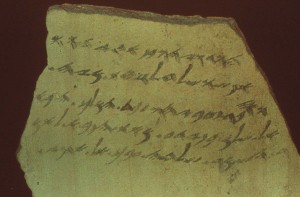Iraq and the Jewish People: The Jews in Exile
Part III
Here was the establishment, in 733 BCE, of the first and longest-lasting exilic community. The exilic community ranged from 733 BCE to 1950 or 1951; one might say that it existed until 1971 when the last Chief Rabbi died. It might even be perceived as lasting until today, as a few dozen Jews may still live there now.
While this deportation was a small one, the Assyrians returned in 721 BCE. At that time, the capital of Samaria fell, leading to the deportation of approximately 27,000 Jews into the Assyrian exile, according to the Bible. These 27,000 Jews are known today as the Ten Lost Tribes. The academic world does not accept the Ten Lost Tribes as they are conventionally under-stood; rather, in academic circles, the loss is viewed as one of tribal identity. In fact, Jews either stayed in the north or were sent to exile. While some of the exiles went to places such as Azerbajan, where it is possible that they were physically lost, the majority are believed to have re-joined the Judean exiles of the year 586 BCE. This first exile, in the year 721 BCE, was in essence the founding of the Jewish community in Iraq, which then stretched toward the north, toward Afghanistan, and to the south, to Fars, which was the original Persia. They were also present in places such as Elam and areas even more distanced from Israel.
In northern Israel, independent cult sites had been set up to compete with the official religious practice in Jerusalem. In 621 BCE, many Judeans were drawn to the south, primarily by the great reformer King Josiah, who rid Israel of pseudo-pagan practices.
At the same time, Mesopotamia underwent major changes. Some of the city-states of Babylon asserted themselves, and, eventually, Babylonia became the major power in the region instead of Assyria. The locus of control shifted to the area that would eventually become Baghdad. It was not long before King Nebuchadnezzar had his designs on the remaining Judean state, hoping the citizens would pay a tribute to him, as they had once paid tribute to Assyria.
However, a series of Israeli kings did not act according to expectations. The first was Jehoiakim, who refused to pay taxes, believing that Egypt would act as a savior. His refusal was, in essence, a revolt, leading to the exile of his son, Jehoiachin, in 597 BCE, along with many leaders and skilled crafts-men. According to the Bible, he “ate bread,” or received a ration. The ration tablets of King Jehoiachin and his five sons, listing their daily and weekly allotments, have been found in ancient Mesopotamia.
King Jehoiachin was replaced by Zedekiah, who also felt that an alliance with other kings, along with the help of Egypt, would enable him to free his country of Babylonian rule. This was surprising, given the fact that King Josiah had been killed in battle supporting Egypt against Babylonia. The kings consistently refused to learn that Babylonian power was too great and that they would be better served paying the tribute and being left to live and worship in peace. While the Bible focuses on the religious aspect of the destruction—that is, the unwill-ingness of the people to listen to prophets like Jeremiah—this narrative is mirrored by the political reality in which the pro-Babylonian party, whose members included Jeremiah, was ignored by the masses. The revolt was provoked and the Babylonians destroyed Jerusalem and the Temple, exiling unknown numbers of Judeans to Babylonia in 586 BCE. Another inde-pendent ruler, Gedaliah ben Ahikam, was appointed governor and subsequently assassinated, and Judean independence ended.


“The first was Jehoiachin, who refused to pay taxes, believing that Egypt would act as a savior. His refusal was, in essence, a revolt, leading to his exile in 597 BCE along with many leaders and skilled crafts-men.”
I may not know the academic writings on this period, but wasn’t it Yehoyakim, not his son Yehoyachin, who initially revolted against the Babylonians? His son was only king for 3 months before being exiled as well.
Thanks for pointing this out. The post has been edited.